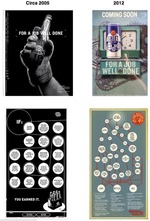Did New Belgium Copy the Work Beer Campaign?
Sadly, in the ad business, copycatting is all to prevalent. Sometimes it's unintentional. Sometimes it's just chance. Sometimes it's an agency "repurposing" old work for a new client. Sometimes it's the client asking a new agency to "repurpose" the work of another agency.
Whatever the case may be, it's always a sticky situation. We'd like to believe maliciousness is never in play. We can't really ever be sure though.
The latest case of copycatting comes from Work Labs, a company that prides itself for creating brands designed for the everyday worker. One of these products was Work Beer, a microbrew brand that was developed in 1999 and brewed for a short time by Main Street Beer Company. In 2005, Work Labs developed an ad campaign for the microbrew.
Yesterday, Work Labs Founder Cabell Harris contacted us (after it had been called to our attention by another source) to tell us his 2005 campaign for Work Beer looked strikingly similar to a 2012 New Belgium campaign for Shift Beer. You can see each campaign side by side here.
Denver-based Cultivator Advertising, which handles three brewery brands, created the Shift Beer campaign.
Regarding the controversy, New Belgium issued a statement which reads, "Here at New Belgium Brewing we have always taken great pride in creating innovative, original communications to engage our audience. Shift Pale Lager is inspired by our twenty-plus year tradition of having a shift beer at the end of the day. The imagery and taglines are reflections of our culture and of the universal sense of accomplishment that comes from collaboration. Shift is our own original work and was created independently."
It could be argued that comparing a long, hard day's work with a cool, refreshing beer is nothing new. But if you examine each campaign, it's quite difficult not to conclude one inspired the other.
In these cases, the truth as to whether or not work was copied is rarely known for sure. All we can do is examine the available evidence and come to our own individual conclusions.


